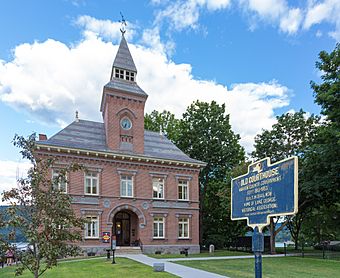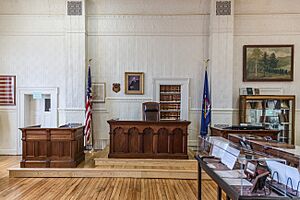Old Warren County Courthouse Complex facts for kids
Quick facts for kids |
|
|
Old Warren County Courthouse Complex
|
|

Courthouse with plaque, 2015.
|
|
| Location | Canada and Amherst Sts., Lake George, NY |
|---|---|
| Area | less than one acre |
| Built | 1845 |
| Architect | Winfield Sherwood |
| NRHP reference No. | 73001282 |
| Added to NRHP | June 19, 1973 |
The Old Warren County Courthouse Complex is a historic building in Lake George, New York. It stands at the corner of Amherst and Canada streets, which are also US 9 and NY 9N. This large brick building was built in different parts from the 1840s to the 1890s. Some of the original parts are no longer there.
The building's tall clock tower makes it a well-known landmark in the village. The county government used this building until the early 1960s. After being empty for several years, local groups worked to save it. They wanted to use it for other public activities. In 1973, it was added to the National Register of Historic Places. Today, it is home to the local historical society and a community arts group.
Contents
Exploring the Old Courthouse Building
The courthouse complex sits on a small piece of land, less than one acre. This land stretches from the street all the way to the shore of Lake George. All the different parts of the building are connected.
The buildings are made of strong brick walls. They sit on a limestone foundation. The roof is made of colorful slate and has six chimneys. There are three main parts left today. These are the judges' chambers, the original courthouse, and the jail wing.
The Judges' Chambers and Clock Tower
The judges' chambers are at the front of the building, facing west. This part is two stories tall and has five sections across its front. A two-stage clock tower rises from the middle of this section. The front door is set back and has an arched entrance.
Between the two stories, there is a decorative brick line. On this line, you can read "WARREN COUNTY" on one side of the tower. On the other side, it says "COURT HOUSE." The second story has a fancy brick design along its roofline. This design is also seen on the first part of the clock tower. The clock tower has a sloped roof and a weathervane on top.
The Original Courthouse and Jail Wing
Next to the judges' chambers, on the east side, is the original courthouse building. This part is one and a half stories tall. It has three sections on each side. Thin columns, called pilasters, separate the narrow windows. The roof has a pointed gabled window, called a dormer window, in the middle of both sides.
The jail wing is to the east, closest to the lake. It is a two-story building with a gabled roof. It has four sections long and three sections wide. The first floor of the jail is an open room with no walls or columns. The second floor's weight is held up by three steel rods. These rods hang from strong supports, called trusses, under the roof.
Inside, the buildings have changed a lot over the years. They have lost most of their unique old designs. However, the courthouse still has its original windows and high ceilings. You can also see some of the original cells in the jail wing.
A Look Back at History
Lake George became the main town, or county seat, when Warren County was formed in 1813. At that time, the town was growing fast. People thought it would be a major trade route to Canada. The town was then called Caldwell. It was named after James Caldwell, a businessman from Albany. He saw the potential for trade in this area.
Early Buildings and a Fire
For the first four years, the county court met in a local coffeehouse. In 1815, Mr. Caldwell gave land for a courthouse. A courthouse, a clerk's office, and a jail were built there. We don't know much about how these first buildings looked. County records show that the courthouse had a wooden dome, called a cupola. This dome often needed repairs. Because of this, the county had trouble getting insurance for it.
In 1843, the courthouse and the county clerk's office burned down. A new building was designed by Winfield Sherwood, an architect from Glens Falls. This new building was finished two years later, in 1845. This is the courtroom building you see today in the middle of the complex. During the 1860 election, it is said that Stephen A. Douglas gave a speech here. He spoke against Abraham Lincoln.
Growing and Changing Over Time
The courthouse complex grew bigger later in the 1800s. In 1878, the judges' quarters were added. This is when the building got its famous clock tower. Seven years later, in 1885, a larger clerk's building was added to the front of the judges' quarters. Some people didn't like how this addition changed the building's look.
The county's Board of Supervisors met here or in Glens Falls. In 1905, a meeting room was built over the county clerk's offices. Since 1860, some people wanted to move the county seat to Glens Falls. Glens Falls had grown much larger than Lake George due to factories. The county did move some offices there and to Warrensburg. But Lake George stayed the county seat.
New Life for an Old Building
In 1959, county voters agreed to build a new county government complex. This new complex was built in Queensbury, a few miles south of the village. It opened in 1963. At that time, the old courthouse was finally left empty.
The building was empty for several years. People even thought about tearing it down. But the new Lake George Historical Association stepped in. They convinced the Town of Lake George, which owned the building, to reopen it. The association used it for their offices and museum. Soon after, in 1969, the 1885 front addition was removed. This helped to bring back the original look of the building's front. In 1977, the Lake George Arts Center joined the historical society. They opened an art gallery in the old courtroom. They also made the building their headquarters.
Images for kids
 | Bayard Rustin |
 | Jeannette Carter |
 | Jeremiah A. Brown |





